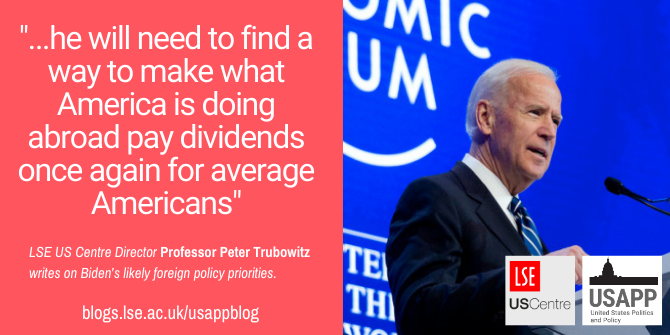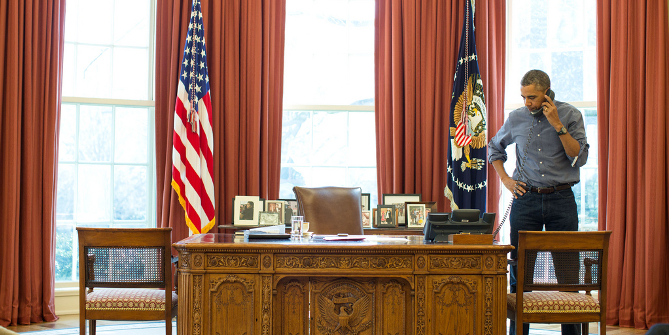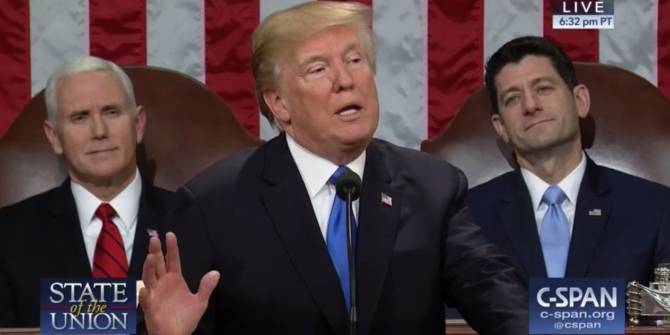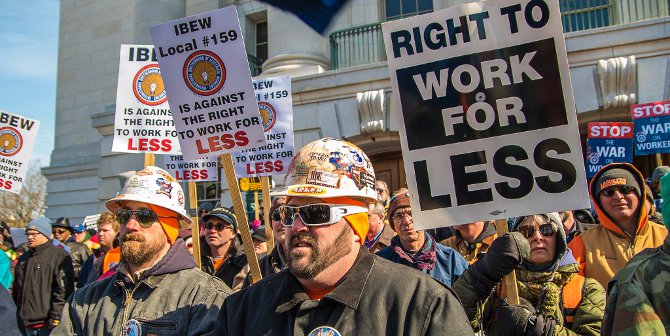 As Joe Biden enters the White House as the 46th President of the United States, he faces a number of significant challenges, including tackling COVID-19 and undoing Donald Trump’s divisive legacy both at home and abroad. LSE US Centre Director Professor Peter Trubowitz writes on Biden’s likely foreign policy priorities: rebuilding strategic, economic and political ties with traditional allies; engaging with China on issues such as trade and human rights; and creating international relationships which better serve the American people.
As Joe Biden enters the White House as the 46th President of the United States, he faces a number of significant challenges, including tackling COVID-19 and undoing Donald Trump’s divisive legacy both at home and abroad. LSE US Centre Director Professor Peter Trubowitz writes on Biden’s likely foreign policy priorities: rebuilding strategic, economic and political ties with traditional allies; engaging with China on issues such as trade and human rights; and creating international relationships which better serve the American people.
For obvious reasons, the early weeks and months of President Biden’s administration will have a focus of laser-like intensity on the home front to get COVID-19 under control, rebuild the economy, and do what he can to heal the nation after four bruising, divisive years of Donald Trump. All of this places sharp limits on how much political capital Biden can afford to invest in foreign policy, at least in the near term. Among other things, this means he will need to set some foreign policy priorities and think carefully about the connection between foreign policy ends and means. With this in mind, here are three things that that I think the Biden administration will try do in the coming weeks and months on the foreign policy front:
Rebuilding bridges with allies
The first is reprioritize America’s traditional allies in Europe and Asia. Biden has said as much on the campaign trail and in interviews since the election. Campaign talk is often “cheap talk,” but there is every reason to take Biden at his word in this case. For one thing, reemphasizing America’s long-standing strategic, economic, and political ties is a clear and unambiguous way to signal that America is turning the page on the Trump era and importantly, to put daylight between himself and his predecessor, politically. At a time when Biden is going to be preoccupied with domestic matters, it is also a cost-effective way to try to make progress on international issues that matter a great deal to most Americans such as climate and human rights. Biden will make a down payment on all of this quickly by rejoining the Paris Climate Treaty and ending the so-called “Muslim ban” on travel.
A new focus on China
Second, I look for Biden to try to take some of the international attention off Trump’s America and refocus it on Xi Jinping’s China. In many ways, Trump was good for Beijing. Trump took pieces like the Trans Pacific Partnership (TPP) and the Transatlantic Trade and Investment Partnership (TTIP) off the strategic chessboard; Trump played to China’s strength by acting unilaterally rather than with America’s many allies; and until late in his administration, Trump made life in the court of international opinion easier for Xi Jinping by turning a blind eye to Beijing’s human rights violations. I would look for Biden to try to flip this script by pressing Beijing on trade, investment, and human rights, while jettisoning Trump’s unilateralism in favor a coordinated approach with America’s allies.
As the recent EU-China agreement indicates, it won’t be easy for Biden to develop such a coordinated approach. But I think there are strong domestic and international political incentives for him to move in this direction. Domestically, concerns about China have increased considerably since the start of the pandemic. Taking a tougher stand on China is one of the few areas in foreign policy that is ripe for bipartisan cooperation. Meanwhile, Europe is hardly of one mind on how to deal with China. The EU-China deal left many on the continent unhappy with a decision they believe put profits before principle. Popular sentiment toward China is also souring in many European countries. These and other internal cross-pressures create bargaining room for Biden.

“Vice President Biden’s adresses at WEF” by U.S. Embassy Bern, Switzerland is licensed under CC BY SA 2.0
Aiming for a foreign policy which benefits average Americans
Last but not least, I look for Biden to work much harder than his predecessors in making foreign policy work for average Americans. In my view, this is really the biggest foreign policy challenge he faces. There was a time when Washington’s efforts to promote international openness, institutionalized cooperation, and multilateral governance enjoyed broad support at home, and that’s because a broad cross-section of Americans believed it served their interests. That’s been lost. If Biden wants to return to some version of that world, and I think he does, then he will need to find a way to make what America is doing abroad pay dividends once again for average Americans.
There are no magic bullets here, but there is much Biden can do. His campaign commitment to adopt federal “Buy American” policies to favor domestic producers is sensible and a political no-brainer. Investing in domestic priorities like infrastructure, education, and energy to create non-tradeable jobs and boost US competitiveness over the longer term is a heavier lift, politically. Still, some Republicans on Capitol Hill will find it in their political interests try to work with Biden on these efforts, especially if they are connected to recovering from the pandemic and making America more competitive vis a vis China. The more Biden invests intelligently here, the more it will ease anti-globalist pressures at home and strengthen US credibility as a reliable partner abroad. This is political capital well spent.
Please read our comments policy before commenting
Note: This article gives the views of the author, and not the position of USAPP– American Politics and Policy, nor of the London School of Economics.
Shortened URL for this post: https://bit.ly/3a4wJOX
About the author
 Peter Trubowitz – LSE US Centre
Peter Trubowitz – LSE US Centre
Peter Trubowitz is Professor of International Relations, and Director of the LSE’s US Centre. His main research interests are in the fields of international security and comparative foreign policy, with special focus on American grand strategy and foreign policy. He also writes and comments frequently on US party politics and elections and how they shape and are shaped by America’s changing place in the world.






